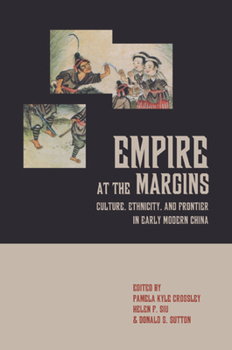Empire at the Margins: Culture, Ethnicity, and Frontier in Early Modern China Volume 28
(Part of the Studies on China Series)
Select Format
Select Condition 
Book Overview
Focusing on the Ming (1368-1644) and (especially) the Qing (1364-1912) eras, this book analyzes crucial moments in the formation of cultural, regional, and religious identities. The contributors examine the role of the state in a variety of environments on China's "peripheries," paying attention to shifts in law, trade, social stratification, and cultural dialogue. They find that local communities were critical participants in the shaping of their...
Format:Hardcover
Language:English
ISBN:0520230159
ISBN13:9780520230156
Release Date:January 2006
Publisher:University of California Press
Length:388 Pages
Weight:1.61 lbs.
Dimensions:1.3" x 6.2" x 9.3"
Customer Reviews
0 rating





